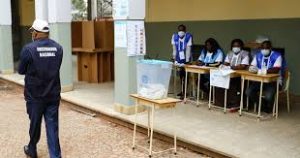 The ruling People’s Movement for the Liberation of Angola (MPLA) declared victory in the country’s general elections, securing an estimated 51% of the vote. With this win, President João Lourenço is set to continue his leadership as Angola’s head of state, despite criticism from the opposition. Angola’s National Electoral Commission, which oversaw the polling process, has reported these preliminary results as votes continue to be finalized.
The ruling People’s Movement for the Liberation of Angola (MPLA) declared victory in the country’s general elections, securing an estimated 51% of the vote. With this win, President João Lourenço is set to continue his leadership as Angola’s head of state, despite criticism from the opposition. Angola’s National Electoral Commission, which oversaw the polling process, has reported these preliminary results as votes continue to be finalized.
The election was marked by a significant showing from the opposition party, the National Union for the Total Independence of Angola (UNITA), which reportedly achieved 44.5% of the votes. Led by Adalberto Costa Júnior, UNITA has challenged the initial results, citing discrepancies and potential bias in the vote count. UNITA’s Vice-President Abel Chivukuvuku has voiced concerns that the results announced so far do not match with the opposition’s internal estimates and suggested that the party may formally contest the outcome. This election is considered one of the closest in Angola’s post-independence history, with UNITA achieving substantial support, particularly among younger voters.
The MPLA, which has held power since Angola’s independence from Portugal in 1975, faced heightened scrutiny amid claims of vote tampering and reports of voter dissatisfaction with Angola’s economic issues, unemployment, and governance. Supporters of UNITA have expressed skepticism over the integrity of the electoral process, given the MPLA’s historical control over state institutions and media.
As of today, Luanda residents have reacted with mixed emotions to the provisional results, with some expressing distrust in the electoral commission’s impartiality. Political analysts anticipate that the close election result may lead to legal challenges and protests in the coming weeks, though the MPLA has called for peace and calm among the population.
The official certification of results by Angola’s electoral authorities is expected in the coming days. Any contestation from UNITA or other opposition parties would likely add to the political tension. The international community is closely watching the situation to monitor for potential unrest.


















